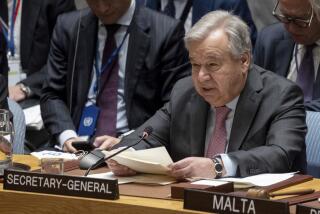U.N. Security Council votes to pursue chemical weapons users in Syria
- Share via
The United Nations Security Council voted unanimously Friday to empower the global chemical weapons watchdog agency to identify the source of attacks with toxic substances in Syria so the perpetrators can be held accountable.
An earlier resolution approved by the 15-member council forced Syrian President Bashar Assad to surrender his 1,300-metric-ton stockpile of banned chemicals to the U.N.-affiliated Organization for the Prohibition of Chemical Weapons after an Aug. 21, 2013, sarin gas attack killed hundreds of civilians in his country.
Those chemicals have been destroyed by the organization, but recent attacks have occurred in the course of Syria’s protracted civil war that have raised suspicions that the Assad government retains toxic substances that are being used against its myriad opponents.
The resolution approved by the Security Council on Friday was drafted by Secretary of State John F. Kerry and Russian Foreign Minister Sergei Lavrov during two meetings earlier this week as they attended diplomatic gatherings in Doha, Qatar, and in Kuala Lumpur, Malaysia.
The measure aimed at identifying the source of chemical attacks banned under international law was a symbolic breakthrough in the former Cold War adversaries’ stunted efforts to negotiate an end to the Syrian conflict, which is now in its fifth year. Russia, a key supporter and arms provider for Assad, had previously rejected calls to assign blame for the attacks that could lead to sanctions against its embattled ally.
The resolution disclosed by Kerry and Lavrov in the Malaysian capital on Thursday asks U.N. Secretary General Ban Ki-moon to draft plans for a joint investigative force with the Organization for the Prohibition of Chemical Weapons within 20 days. The Hague-based chemical weapons monitors had previously been tasked with proving that chemical weapons had been used in Syria but not with identifying their users.
“Pointing a finger matters,” U.S. Ambassador Samantha Power said after the vote, hailing the resolution’s passage as a major advance in the world body’s effort to stop the use of chemicals as weapons.
The United States and Russia remain at odds over how to bring an end to the Syrian civil war because of their support for opposite sides in the conflict that, by U.N. count, has taken 250,000 lives, and made refugees of 4 million Syrians.
Follow @cjwilliamslat for the latest international news 24/7
More to Read
Sign up for Essential California
The most important California stories and recommendations in your inbox every morning.
You may occasionally receive promotional content from the Los Angeles Times.














